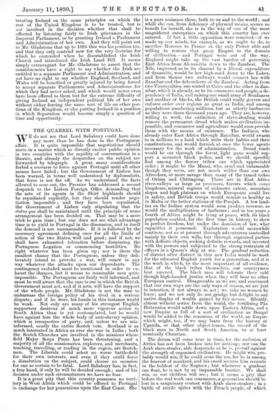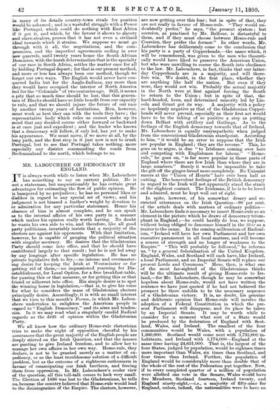THE QUARREL WITH PORTUGAL.
WE do not see that Lord Salisbury could have done any more than he has done in the Portuguese affair. It is quite impossible that negotiations should move in a matter which so directly excites public opinion in two countries with the rapidity of conversations in a theatre, and already the despatches on the subject are forwarded by telegraph. A great many considerations forbid a recourse to force against Portugal until all other means have failed ; but the Government of Lisbon has been warned, in terms well understood by diplomatists, that force is not far off. As we understand the facts allowed to ooze out, the Premier has addressed a second despatch to the Lisbon Foreign Office demanding that the acts of its agents in the Shire highlands should be repudiated explicitly, lest they should render nego- tiation impossible ; and they have been repudiated, the Government of Lisbon only stipulating that the status quo shall be maintained until the principle of some arrangement has been decided on. That may be a mere trick to gain time ; but one does not see what advantage time is to yield to Portugal in the discussion, and in itself the demand is not unreasonable. If it is followed by the necessary agreement defining once for all the limits of action of the two States, well and good ; and if not, we shall have exhausted toleration before dismissing the Portuguese Legation or commencing hostilities. No right whatever has been given up ; nor is there the smallest chance that the Portuguese, unless they deli- berately intend to provoke a, war, will renew in any way whatever the attacks upon our dependants. The contingency excluded must be mentioned in order to ex- haust the chances, but it seems to reasonable men quite impossible. The Portuguese are fairly well informed, and must be well aware that the case is one in which the British Government must act, and if it acts, will have the support of the whole people. Mr. Gladstone is not the man to embarrass the foreign policy of his rival in a serious dispute ; and if he were, his hands in this instance would be weak. Not only are many of his strongest English supporters desirous of much more vigorous action in South Africa than is yet contemplated, but he would have against him the whole body of anti-slavery- opinion, which is irrespective of party, and, unless we are mis- informed, nearly the entire Scotch vote. Scotland is as much interested in Africa as ever she was in India ; both the Scotch Churches are involved in the missions whose field Major Serpa Pinto has been threatening, and a majority of all the missionaries, explorers, and merchants, teaching, travelling, or trading in the region, are Scotch- men. The Liberals could select no worse battle-field for their own interests, and even if they could force a dissolution on the subject, could choose no occasion for one so certain to be fatal. Lord Salisbury has, in fact, a free hand, if only he will be decided enough ; and of his decision under such circumstances we have no fear.
It is a great pity that this country possesses no terri- tory in West Africa which could be offered to Portugal in exchange for her possessions upon the East Coast. She is a pure nuisance there, both to us and to the world ; and while she can, from deficiency of physical means, secure no benefit for herself, she is in the way of one of the most magnificent enterprises on which this country has ever entered. If but a little opposition were removed—if we made up our minds, for example, as we ought to do, to sacrifice Morocco to France as the only Power able and willing to restore that great Empire to the domain of civilisation—and Portugal were out of the way, England might take up the vast burden of governing East Africa, from Alexandria down to the Zambesi. The Nile, improved as to its channel by a liberal expenditure of dynamite, would be her high-road down to the Lakes, and from thence two railways would connect her with Zanzibar and the debouchure of the Zambesi. Acting from two Viceroyalties, one seated at Cairo and the other in Zan- zibar, which is already, as to its commerce and people, a de- pendency of India, and raising one small army of Soudanese and another of blacks, the British could really govern and enforce order over regions as great as India, and among populations numbering millions, but as utterly barbarous as they were three thousand years ago. They are, however, willing to work, the extinction of slave-stealing would remove the permanent dread which makes civilisation im- possible, and commerce and agriculture would soon provide them with the means of existence. The Indians, who already enter East Africa through Zanzibar, would swarm in in millions to a land which suits their habits and their constitutions, and would furnish at once the lower agents necessary for the work of administration. Broad roads would be cut through the forest, light guns would sup- port a mounted black police, and we should speedily find. among the fiercer tribes one which appreciated order ; it might be the Masai, who, cruel and untameable though they seem, are not much wilder than our own Afreedees, or more savage than many of the tamed tribes of Orissa and Chittagong. There are in East Africa river-valleys as large as provinces, forests which cover kingdoms, mineral regions of unknown extent, mountain slopes and high plateaux on which Europeans could live in safety, and British troops would remain as healthy as in Malta or the better stations of the Punjab. A low land- tax on the Indian system would soon produce revenue, as would the multiplication of harbours ; and in ten years a fourth of Africa, might be lying at peace, with its black population enabled, for the first time in history, to show in perfect freedom, but under the dominion of law, what capacities it possessed. Exploration would meanwhile continue, not as at present through adventurers controlled mainly by their own wills, but through organised parties with definite objects, seeking definite rewards, and invested with the powers and subjected to the strong restraints of officers in a Queen's ship at sea. The gradual reduction of district after district in this new India would be work for the educated English youth for a generation, and it is the work in which, by the most important of all evidence, that of the black tribes themselves, our countrymen best succeed. The black men will tolerate their cold though high-handed justice when they will bear no other European control. Disagreeable as we are, and convinced that our own ways are the only ways of reason, we are just in intention, if not always in act ; we take no women by force ; and we not only do not grudge but delight in any native display of wealth gained by fair means. Silently, almost without notice from the world, the fertilising Pax Britannica would settle down upon Eastern Africa, and a new Empire as full of a sort of civilisation as Bengal would be added to the resources of the world, an Empire which might, too, if we may learn from the history of Uganda, or that other object-lesson, the record of the black man in North and South America, be at least nominally Christian.
The dream will come true in time, for the seclusion of Africa has not been broken into for nothing ; nor can the Arab slave-stealer, able desperado as he is, prevail against the strength of organised civilisation. He might win, pro- bably would win, if he could cross the sea, for he is among the bravest of mankind, and his creed secures him recruits in the boldest of the Negroes ; but wherever a. gunboat can float, he is met by an impassable barrier. We shall win, as our children will see ; but it seems a pity that before the real work can commence, a generation should be lost in a sanguinary contest with Arab slave-stealers ; in a battle of sterile spites with the French people, of which in many of its details country-town rivals for position would be ashamed ; and in a wasteful struggle with a Power like Portugal, which could do nothing with East Africa if it got it, and which, by the favour it shows to slavery and slave-stealers, proves that it has not even a civilised ideal towards which it strains. We suppose we must go through with it all, the negotiations, and the com- promises, and the imperfect agreements ending in ever mow quarrels, until twenty years hence the South African Dominion, with the harsh determination that is the specialty of our race in South Africa, settles the matter once for all by bidding Portugal depart ; for that is our present method, and more or less has always been our method, though we forget our own ways. The English would never have con- quered India but for the Anglo-Indians, any more than they would have occupied the interior of North America but for the "Colonials " of two centuries ago. Still, it seems a pity that so:much time should be lost, that this genera- tion of Blacks should have so little benefit from our capacity to rule, and that we should injure the future of our race by another twenty years of hesitations. Men, however, must work as best they can with the tools they have ; the representative body which rules us cannot make up its mind that any decided course either forward or backward is at once just and expedient ; and the leader who knows that a democracy will follow, if only led, has yet to make his appearance. We must move, if we move at all, by the long path, and the first step in it just now is not to crush -Portugal, but to see that Portugal takes nothing, more especially any district commanding the roads from ;Bechuanaland to the north, -which belongs to us.







































 Previous page
Previous page